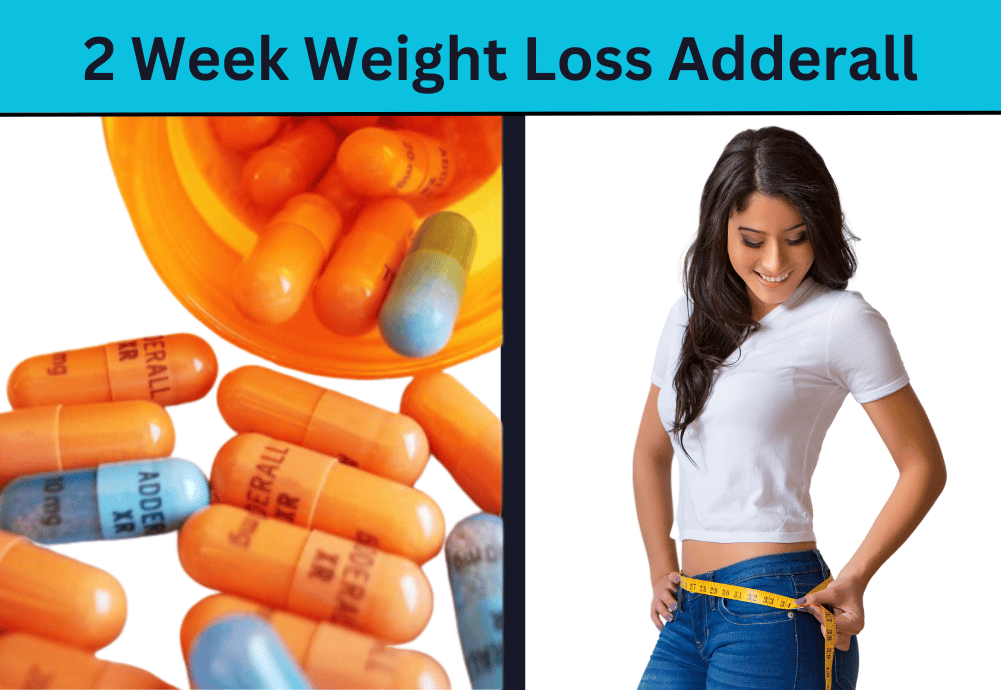Using Adderall for weight loss is not recommended due to its potential health risks. Weight loss within two weeks can be unsafe and unsustainable.
Adderall, commonly prescribed for ADHD, often suppresses appetite, leading some to use it for quick weight loss. Yet, dropping pounds rapidly in a fortnight typically involves unhealthy practices and can endanger your wellbeing. Such a strategy isn’t just unadvised; it’s also often a misuse of prescription medication.
Amidst a sea of diet plans and weight loss advice, it’s tempting to gravitate towards quick fixes. Remember, there’s no magic pill for healthy weight reduction. Instead, consistent lifestyle changes like balanced eating and regular exercise stand as the cornerstones of truly effective weight management. It’s important to prioritize safety and speak to a healthcare provider before embarking on any weight loss plan, especially one involving prescription drugs.
Credit: www.bloomberg.com
Introduction To Adderall And Weight Loss
When it comes to weight management, the conversation often turns to lifestyle changes like diet and exercise. Yet, some seek alternate routes in hopes of quicker results. Enter Adderall, a prescription medication traditionally used to treat conditions like ADHD, which has also become associated with weight loss. This controversial practice has gained attention, prompting discussions about the risks versus the potential weight loss benefits. This section delves into how Adderall affects the body and its connection to weight loss.
Understanding Adderall: Uses And Effects
Adderall, a blend of amphetamine salts, is commonly prescribed to enhance focus and curb impulsivity and hyperactivity in individuals with ADHD. Its ability to increase concentration and cognitive performance has also made it popular among those seeking an edge in academics or professional settings. Yet, it’s vital to understand that Adderall is a potent central nervous system stimulant, which alters neurotransmitter activity in the brain, leading to various physiological effects, including changes in appetite and metabolism.
The Link Between Adderall And Appetite Suppression
- Diminished hunger: Adderall can reduce feelings of hunger by increasing the levels of dopamine, a neurotransmitter that plays a role in reward and pleasure.
- Altered eating patterns: Users might experience a lack of interest in food, often skipping meals or eating less than usual.
- Metabolic impact: Apart from decreasing appetite, Adderall may also slightly raise the body’s resting metabolic rate, contributing to calorie burn.
This appetite suppression is often the catalyst for weight loss in individuals using Adderall, both legally and illicitly. Health professionals, however, caution against the non-prescribed use of Adderall, as the consequences can outweigh the temporary weight loss benefits.
Exploring The Concept Of Rapid Weight Loss
Rapid weight loss is often defined as losing significant weight in a short period, typically aiming for several pounds per week. While the idea might be appealing, particularly with promises of quick results from medications like Adderall, it comes with potential risks. Quick weight changes can lead to issues such as nutrient deficiencies, loss of lean muscle mass, and metabolic slowdown. It’s also common for individuals to regain the weight once they stop using the medication, due to a return of normal appetite levels and the body’s physiological readjustments.
It’s crucial to approach weight loss with a long-term and sustainable mindset, prioritizing healthy eating habits, regular physical activity, and emotional well-being over the allure of rapid results. Consulting healthcare professionals before starting any weight loss medication or program is also key to ensuring safety and effectiveness.
Credit: radaronline.com
The 2-week Adderall Weight Loss Plan
Embarking on a weight loss journey often involves seeking out various diet and exercise programs. Among the more unconventional methods is the use of prescription medication, such as Adderall, for weight loss. Primarily prescribed to treat ADHD, Adderall is an amphetamine that can suppress appetite, but this 2-Week Adderall Weight Loss Plan is not a standard approach and demands careful consideration. This blog post delves into the intricacies of utilizing Adderall responsibly for weight loss over a short 14-day span.
Precautions Before Starting An Adderall Weight Loss Regimen
Before beginning any weight loss strategy with Adderall, consulting a healthcare provider is crucial. The risks of using a stimulant for weight loss include potential dependency, cardiovascular issues, and psychological effects. Key precautions include:
- Medical clearance by a professional
- Understanding your current health status
- Determining the appropriateness of Adderall for your situation
- Acknowledging the short-term nature of this plan
Daily Dosing And Monitoring For Safe Weight Loss
When using Adderall for weight loss, a precise dosage that considers an individual’s health profile is essential. Begin with the lowest effective dose to gauge the body’s reaction. Monitoring should include:
- Regular check-ins with a healthcare professional
- Keeping track of side effects
- Adjustments to dosage as needed
Note: Never exceed the recommended daily dose to prevent potential health risks.
Dietary Recommendations To Enhance Adderall’s Efficacy
While Adderall may suppress appetite, a nourishing diet remains vital. To maximize Adderall’s efficacy for weight loss, include:
| Nutrients | Food Sources |
| Protein | Lean meats, beans, nuts |
| Fiber | Fruits, vegetables, whole grains |
| Hydration | Water, herbal teas |
Strive for meals that balance macronutrients and provide extended energy.
Incorporating Exercise For Balanced Weight Reduction
Complement the 2-week Adderall weight loss strategy with regular exercise to achieve a balanced approach. Aim for a blend of:
- Cardiovascular workouts (e.g., walking, cycling)
- Strength training (e.g., weightlifting, resistance bands)
- Flexibility exercises (e.g., yoga, stretching)
Remember to listen to your body and adjust intensity as needed. Consistent physical activity not only aids weight loss but also improves overall wellbeing during the regimen.
Risks And Considerations Of Using Adderall For Weight Loss
Embarking on a weight loss journey often leads to considering various methods to achieve quick results. Adderall, commonly prescribed for ADHD, has gained notoriety as a weight loss tool due to its appetite-suppressing effects. However, this off-label use comes with significant risks and considerations that warrant careful thought. The allure of rapid weight loss may seem tempting; nevertheless, the potential consequences are far-reaching and can impact long-term health and legality.
Potential Side Effects And Health Implications
Using Adderall without medical supervision can lead to a host of undesirable side effects. Some of the most critical concerns include:
- Cardiovascular issues such as hypertension and tachycardia
- Mental health effects, including mood swings, anxiety, and even depression
- Insomnia and disrupted sleep patterns
- Malnutrition due to reduced appetite and potential vitamin deficiencies
Beyond immediate side effects, longer-term use can result in serious health implications such as organ damage or a potential increase in the risk of heart attack or stroke.
Addiction And Dependency Risks
Adderall is a drug with a high potential for abuse, leading to dependency and addiction. As a central nervous system stimulant, it can cause users to develop tolerance, necessitating higher doses to achieve the same effects. Signs of addiction may include:
- An overpowering desire to continue taking Adderall despite health risks
- Experiencing withdrawal symptoms when not using the drug
- Neglect of personal and professional responsibilities
Dependency is not only a physical challenge but also a psychological hurdle that can profoundly affect personal wellbeing and relationships.
Legality And Ethical Concerns Of Off-label Adderall Use
Adderall is a controlled substance in many countries, and using it without a prescription – or for purposes other than prescribed – can lead to legal repercussions. Health professionals caution against off-label use for reasons other than intended, particularly for weight loss. Ethical considerations also come into play when considering the misuse of medications that are intended for individuals with specific health conditions.
Safer Alternatives To Adderall For Weight Management
There are many safer and more effective methods for managing weight. Health experts recommend:
- A balanced diet rich in nutrients and low in processed foods
- Regular physical activity tailored to individual fitness levels
- Behavioral therapy to address patterns contributing to weight gain
- Medically supervised weight loss programs
These alternatives not only promote weight loss but also encourage a holistic approach to health, reducing the potential for harm associated with stimulant-based weight loss methods like Adderall.
Credit: www.greatgreenwall.org
Realistic Outcomes And Sustainable Health Practices
Exploring the path of rapid weight loss can be tempting, especially with substances like Adderall getting attention for their ability to shed weight quickly. However, when considering this for a 2-week weight loss plan, it’s crucial to anchor expectations in reality and commit to practices that prioritize sustainable health. Here, we’ll delve into what can realistically be achieved within such a short time frame and how to maintain health beyond the initial loss.
Setting Realistic Goals For Weight Loss
Starting a weight loss journey with a clear and realistic goal is imperative. While Adderall has been noted for causing significant weight loss due to appetite suppression, it’s important to recognize the potential risks and the unlikelihood of maintaining such rapid weight loss. A healthy rate of weight loss is typically 1-2 pounds per week, which can be more sustainable and safer over time.
Maintaining Weight Post-adderall: Strategies And Tips
- Consult a healthcare provider to design a tailored weaning-off plan.
- Transition to a nutrient-dense diet that incorporates whole foods.
- Establish a regular exercise routine to boost metabolism.
- Consider cognitive-behavioral therapy to manage potential eating disorder patterns.
The Role Of Mental Health In Weight Management
It’s often underappreciated how much our mental health impacts weight management. Stress, anxiety, and emotional eating are significant factors that can sabotage weight loss efforts. One should foster a positive mindset, seek support from friends or professionals, and potentially engage in mindfulness practices to maintain a healthful approach to weight and overall wellness.
Long-term Health Considerations Beyond The 2-week Period
Short-term weight loss can sometimes lead to longer-term health problems if not managed appropriately. It is crucial to look beyond the initial 2-week period and plan for the future. This involves understanding the body’s need for a balanced diet, regular physical activity, and adequate sleep — all essential for long-term health and weight management. Ignoring these factors can increase the risk of weight regain and put one’s overall health at jeopardy.
The Big Picture In Rapid Weight Loss
As we’ve delved into the world of rapid weight loss, the allure of quick fixes often overshadows the underlying risks and ethical considerations. The case study of Adderall’s off-label usage for weight loss poses critical questions about effective and safe practices in our health-centric society. Emphasizing speed over sustainability can lead to choices that, while initially gratifying, may conflict with long-term wellness. Let’s encapsulate Adderall’s impact on weight loss, ponder the ethical landscape, and champion a comprehensive perspective on health.
Summary Of Adderall’s Role In Weight Loss
Adderall, a drug primarily prescribed for ADHD, has notable appetite-suppressing effects that can lead to weight loss. Its role in this unintended domain underscores a remarkable transformation for some users:
- Decreased appetite
- Caloric deficit facilitation
- Short-term weight reduction
However, this comes with a caveat. The weight loss experienced is often unsustainable and Adderall may introduce health risks when used without medical supervision.
Reflecting On The Ethics And Safety Of Weight Loss Shortcuts
The discourse on the ethics and safety of rapid weight loss through pharmacological aids is intricate and multifaceted. Utilizing Adderall without a prescription introduces ethical dilemmas and potential health hazards:
- Non-prescribed use signifies a deviation from medical guidelines.
- It bypasses the critical assessment of risk-to-benefit ratios by a healthcare professional.
- There’s a risk of dependency and adverse side effects.
Reflecting on these points is imperative to making informed decisions that uphold ethical standards and prioritize safety.
Advocating A Holistic Approach To Health And Wellness
In the quest for weight loss and improved health, a holistic approach offers a balanced and sustainable path. This involves:
| Key Elements | Benefits |
| Nutritional Balance | Provides essential nutrients and energy. |
| Physical Activity | Enhances metabolism and muscle toning. |
| Mindfulness Practices | Promotes emotional well-being and stress reduction. |
| Medical Guidance | Ensures personalized and safe health strategies. |
Championing this approach takes into account the whole person—mind, body, and spirit—and aligns with the pursuit of lasting wellness.
Frequently Asked Questions Of 2 Week Weight Loss Adderall
How Much Weight Did You Lose On Adhd Medication?
The weight loss on ADHD medication varies per individual, with some reporting a loss of 5-10 pounds initially due to appetite suppression.
Does Adderall Speed Up Metabolism?
Adderall can slightly increase metabolism due to its stimulant properties, which may raise heart rate and energy expenditure.
How Long Do You Have To Take Adderall To See Results?
Adderall’s effects can often be noticed within 30 minutes to an hour. Full benefits usually accrue within a few weeks of consistent use. Always follow your doctor’s dosage instructions for optimal results.
Does Adderall Take Weeks To Kick In?
Adderall typically starts working within 30 minutes to an hour after taking it. It doesn’t require weeks to take effect.
Conclusion
Summarizing our journey with Adderall for weight loss, it’s crucial to remember safety first. Embracing a holistic approach yields sustainable results, often outshining quick fixes. As always, consult a healthcare provider before starting any regimen. Health triumphs when we balance ambition with well-being.
Start your transformation with advice, not haste.




Leave a Reply